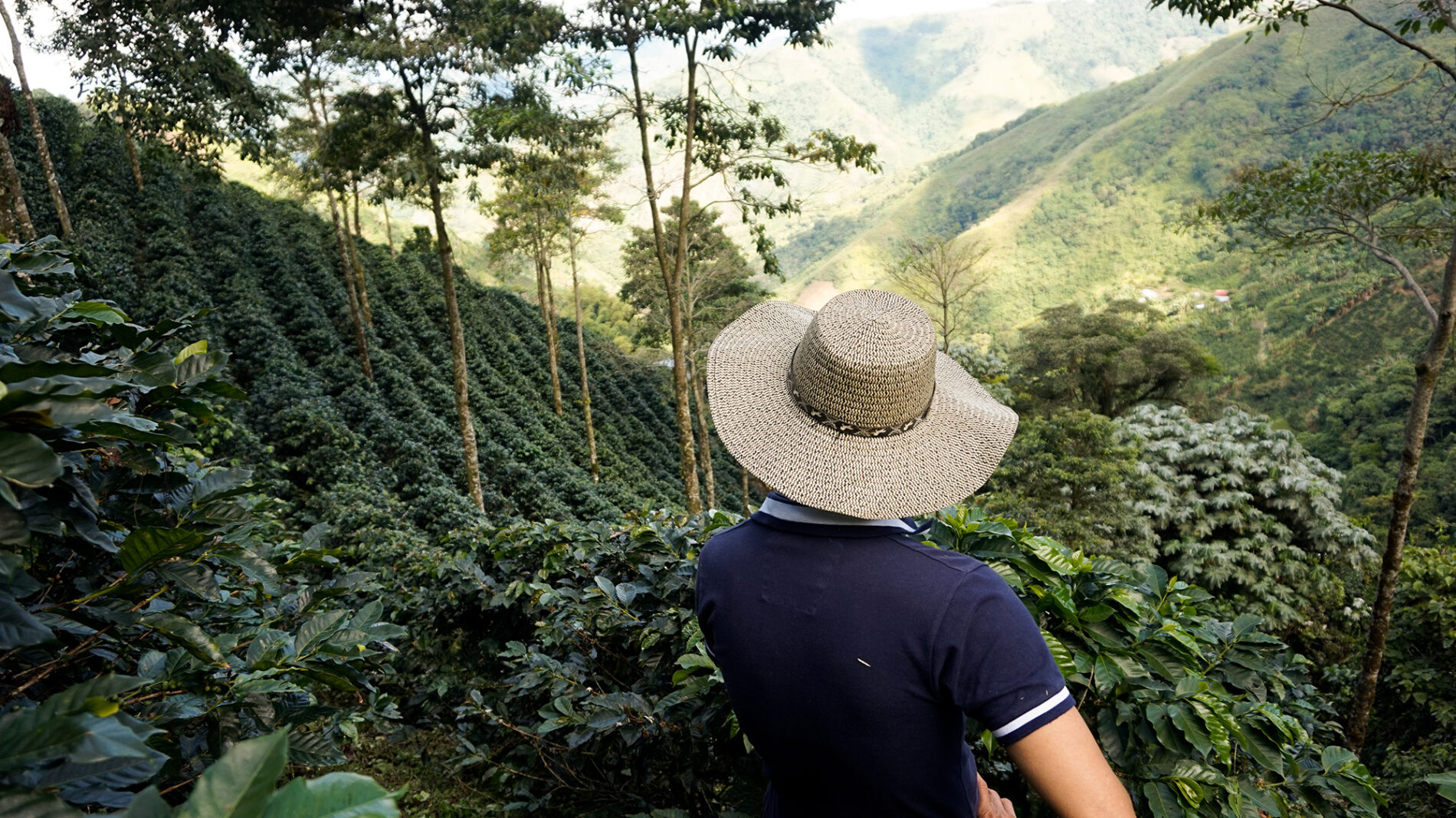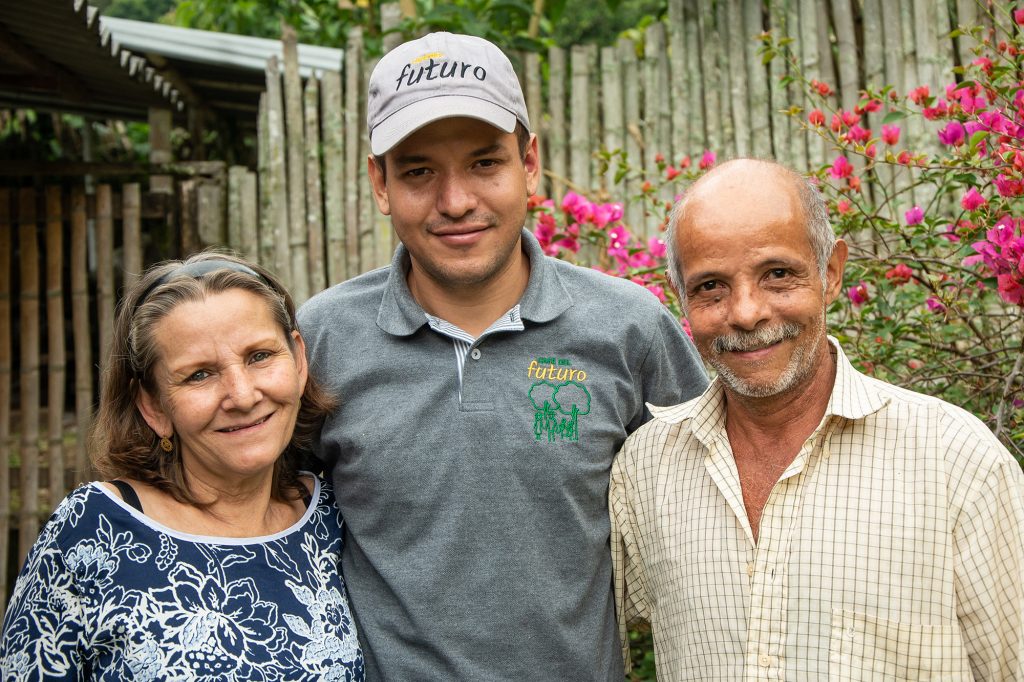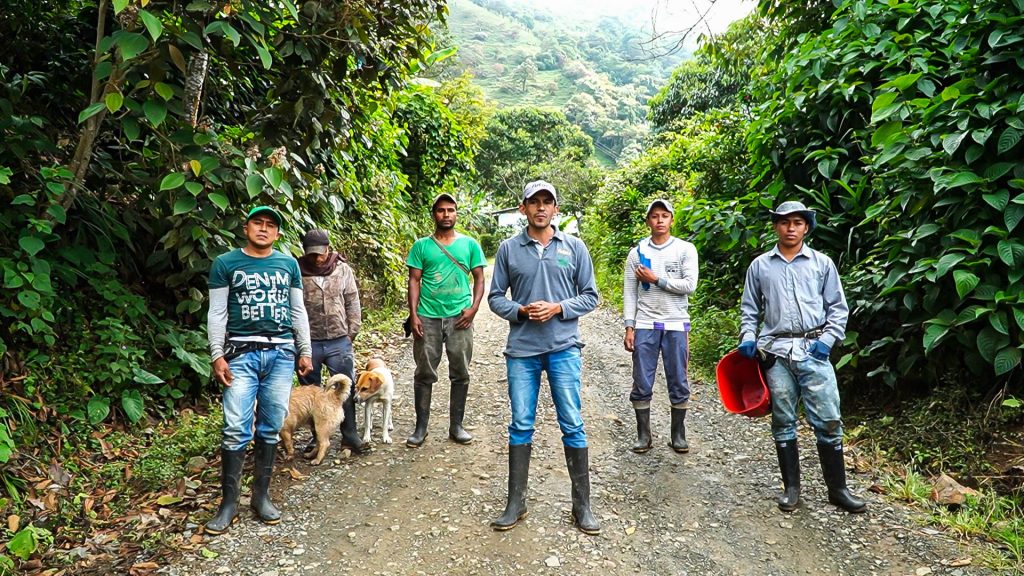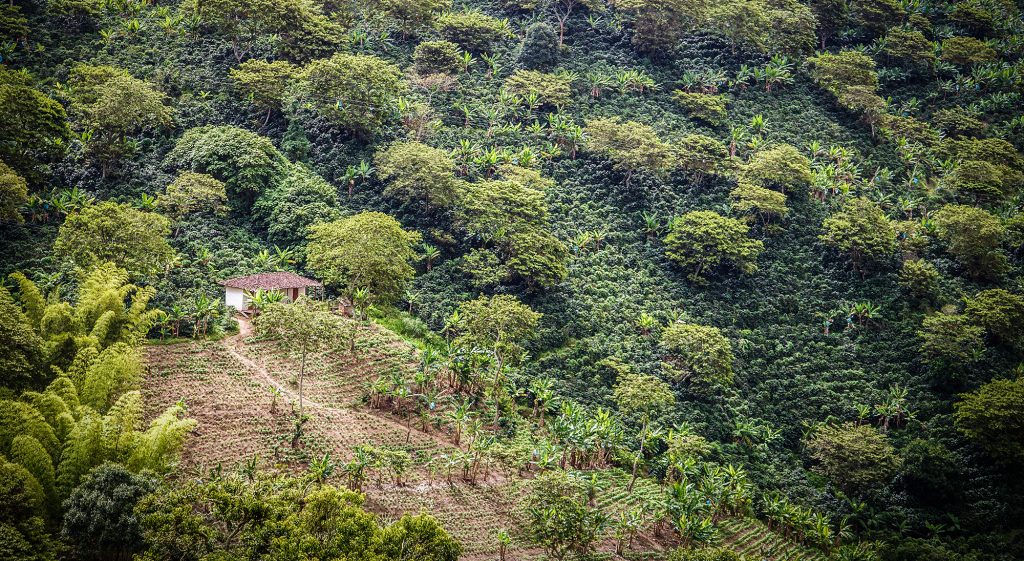
Banking on green: financial service firms use tech to nurture a more sustainable planet
Edwin Zapata remembers the year 2008. It was the first mass planting of trees—450 walnut trees, to be exact, to cover the small, 30,000 square meter (3 hectares) coffee farm Zapata’s family has owned for 32 years, in Mistrató, Colombia. Located only 1,550 meters above sea level, the farm has always been challenged by the excessive rain and extreme heat – the risks of growing coffee in the Risaralda region of what is known as Colombia’s Coffee Triangle.
With climate change, both challenges have intensified. More rain, more water—and with them, flooding of fields and landslides on the hilly terrain, create more potential to destroy crops. Relentless sun burns the coffee beans on the vine, rendering them useless for production. So, planting the trees served a dual purpose: soak up the excess water and provide shade to shield the coffee beans from the sun’s fiercest rays.

Today, 13 years later, Zapata is still planting trees—but now with even more purpose. His farm is an example of biodiversity, growing mangos, bananas, oranges, tangerines, lemons, acacias, avocados, and diverse other fruits in addition to coffee. As he continues to plant trees, the earth is recovering, birds are returning, and the soil is nourishing the wide variety of crops that require much fewer chemicals to bring to production. And the farm is capturing, not emitting, carbon dioxide from the atmosphere.
This is made possible through a project that connects farmers like Zapata to large corporations to capture carbon dioxide by planting trees and other sustainable agricultural practices. The project is a collaborative effort by Rabobank, a Dutch multinational banking and financial services company headquartered in Utrecht, The Netherlands, and Solidaridad, an international civil society organization that works to foster more sustainable supply chains. Solidaridad’s “Coffee of the Future” initiative seeks to transform more than 36,000 hectares of conventional coffee to “climate-smart coffee” by helping 7,300 producers throughout Colombia and Peru. Then, by working with farms around the globe Rabobank’s “Agroforestry Carbon Removal Units for the Organic Restoration of Nature” (ACORN) program piggybacks on top of Solidaridad and other partners’ programs to compensate the carbon dioxide sequestered by farmers like Zapata. This ability to sell carbon is made possible with an Azure Cloud-based platform developed by Rabobank in collaboration with Microsoft. The end goal of the Rabobank-Microsoft partnership is to create a global and scalable AI- and machine learning-based platform that will empower farmers while also addressing the urgency of climate change all over the world.
“You could feed a family on the sheer variety of what we grow,” says Zapata, a fourth-generation coffee farmer with a degree in agronomy from Universidad de Santa Rosa de Cabal (UNISARC), who is deeply involved in the science of ecosystems and sustainable agriculture. He’s proud of what he’s been able to do with the help of Rabobank and other sustainability programs offered to coffee farmers like him.
Financial services firms playing active roles in global sustainability
Financial services firms today are helping the planet in three separate but related ways.
First, due to the urgency of climate change, banks like Rabobank are financing the greening of their current portfolios. They are also providing capital injections to new green solutions and companies. And finally, due to high customer demand, banks, brokerages, and other financial services firms increasingly offer new investment products that support sustainable initiatives. This last point is essential, as financial services customers generally want to be associated with institutions that are helping the planet. Younger generations, particularly, are consciously choosing banks with solid environment, social and governance (ESG) stances.
Because of the size and urgency of the climate change crisis, technology will play an important role in coming up with solutions, say experts. There’s all the data to monitor, collect and analyze, all the advanced analytics models to build using applied AI and machine learning, and all the communications infrastructure to put into place.
“Rabobank’s CEO met with [Microsoft CEO] Satya Nadella, and we had an instant alignment on our sustainability goals,” says Jelmer Van De Mortel, head of the ACORN initiative, at Rabobank. “For us, the technology was very important because of the ingestion of satellite data and the AI models and the scalability of the infrastructure that we required. Applying technology to our most urgent sustainability issues is key.”
Rabobank: Addressing corporate CO2 emissions while supporting smallholder farmers
Zapata’s experience is a shining example of what the financial services industry is enabling. Climate change is increasingly impacting global agriculture. Ninety percent of the 608 million farms in the world are family farms, operating 70–80% of farmland and producing approximately 80% of the world’s food, according to new research by the Food and Agriculture Organization of the United Nations (FAO).
Five of every six farms in the world are very small farms–less than two hectares. Although they are responsible for only around 12% of all agricultural land, they produce roughly 35% of the world’s food.
But agriculture is also responsible for 24% of global greenhouse gas emissions. Unlocking the potential of smallholder farmers to become a global force for good in addressing climate change has become a joint goal for Solidaridad and Rabobank.

Although the Rabobank ACORN initiative is global and encompasses a broad range of agricultural products, coffee growers are a particular focus in its partnership with Solidaridad in Colombia. Most of the coffee the world consumes is produced by 17.7 million small-scale coffee farmers, the majority of whom live at the poverty line. Although a carbon market for agriculture exists, small farmers have been unable to participate due to high transaction costs and the inability to verify the carbon assets they sequester (capture). But with the Rabobank platform, this is now possible. The farmers measure the difference in biomass–how much CO2 a farm has produced, and how much has been sequestered (with the help of remote satellite sensing and AI algorithms. If the farm has sequestered more CO2 than it has produced, the delta can be sold to companies needing to offset their own CO2 emissions.
Van De Mortel says the goal is to get more than one million farms onto the platform. Already, the farmers are seeing benefits. The project has reduced carbon emissions through better soil, fertilizer and wastewater management. For example, in Colombia, on average participating farms went from carbon positive to carbon negative within just three years.
Also, the project has enabled farmers to increase quality and consistency of their produce. Productivity of participating farms went up by 15-20% over three years. Income has increased by 20%. In Atehortua’s case, his farm captured 24 tons of CO2 between May 2020 to May 2021.
Solidaridad and Rabobank are currently scaling the pilots to include new regions. Solidaridad supports these farmers with registration, ground analysis and technical support. Rabobank ensures through its trading platform that the producers will be compensated each year for reducing Co2.
The program fulfills three purposes. “It is improving or combating climate change and land degradation while at the same time increasing food security and improving the livelihoods of smallholder farmers,” says Van De Mortel. “Also, helping our clients transition to sustainability goes hand in hand with our business model for making smallholder farmers bankable and making new investments. For the financial sustainability of the bank, this helps from both profit and risk perspectives.”
Inspiring every individual to live more sustainably
Rabobank isn’t the only financial services firm attempting to mitigate the risks of climate change using advanced technology. Today, the financial industry is increasingly leading the way to help realize the ambitions of key sustainability initiatives like the UN Sustainability Goals and the European Green Deal. And they’re finding that technology is key. Flowe, a fintech startup founded by one of Italy’s largest banks, Banca Mediolanum, collaborated with Microsoft Consulting Services to build a mobile app targeting millennial customers by coaching them on how to live more environmentally friendly lives.
“We can’t see a future for finance without a sustainability mindset,” says Ivan Mazzoleni, Cultural Energy Orchestrator (CEO) at Flowe. “We are living a revolution called conscious capitalism. For us, we’re at a point of no return. We can no longer just focus on monetary returns. So much more is at stake. And technology is key to our success.”

Flowe believes that although addressing the emissions of large corporations is critical, so too should individuals be making more informed choices on how they live their lives—how they move, travel, and consume products and services.
“At Flowe, we are promoting a completely new economical paradigm,” says Mazzoleni. “We are calling it the ‘better-being economy,’ in which personal improvement is totally aligned with overall improvement—the improvement of society, and of the environment.”
Like other online banks, Flowe has an IBAN, free Eurozone ATM withdrawals and integration with Apple Pay and Google Pay. But its card, issued by MasterCard, is made of wood that comes from sustainable and certified forests. And it has a highly differentiated value proposition: Flowe believes that when customers understand the environmental impact of their financial decisions, they will start to make changes, especially if they see that others are on the same journey.

Through its Azure Cloud-powered app, driven by AI and machine learning, Flowe can quickly review every aspect of customer data, such as credit card transactions, CO2 impact, personal health or how customers are engaging with educational video content provided through the app. It was built from the ground up using technologies such as Azure Kubernetes Service and a microservices-based architecture, which makes it easy to plug into innovative third-party solutions.
From all this data, the bank pinpoints behaviors and inspires customers to make more sustainable choices.
“One of the ways we do this is by using the Microsoft AI platform to give small, gentle nudges that can help people create more meaningful lives,” says Mazzoleni. For example, he says, the app might nudge a customer on what the carbon impact is of shopping at one store versus another.
In addition to nudging consumers in the right direction, Flowe is also involved in capturing CO2. They have a partnership with reforestation startup ZeroCO2, which has planted more than 145,000 trees in the Pèten region of Guatemala. Flowe customers can see where their tree is located and follow its growth through photos sent by the bank.
“Flowe is really grounded around the concept of what it calls ‘innovability.’ This means that innovation is not just combined, but working in synergy with sustainability,” says Mazzoleni. “From our point of view, the climate or environment is just one piece of the sustainability topic. There’s people, citizenship, society, and technology, in addition to the environment. We address all of these aspects.”
Inspiring the next generation
Back in Colombia, Zapata says he and his fellow coffee farmers in the region are happy with what they have been able to accomplish on their farms by participating in Rabobank and Solidaridad’s program.
His farm is now producing higher-quality coffee to sell—which means more money coming in. He is particularly enjoying the biodiversity the new plantings have brought to his farm including animals and especially the birds. The birds are so numerous and diverse that the farmers in his region are thinking of turning it into a tourist attraction for bird lovers.
“Today, when I stand in my farm, I get a feeling for its beauty and natural wonders that I haven’t felt for decades,” he says. “I am eager to make more progress and inspire future generations.”

